 Petzlover
Petzlover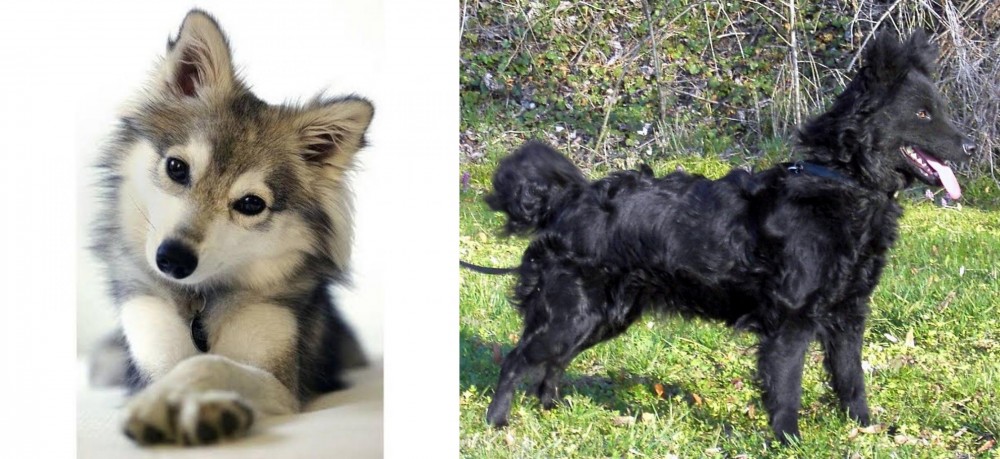 Miniature Siberian Husky is originated from United States but Mudi is originated from Hungary. Miniature Siberian Husky may grow 8 cm / 3 inches shorter than Mudi. Both Miniature Siberian Husky and Mudi are having almost same weight. Both Miniature Siberian Husky and Mudi has same life span. Both Miniature Siberian Husky and Mudi has almost same litter size. Both Miniature Siberian Husky and Mudi requires Moderate Maintenance.
Miniature Siberian Husky is originated from United States but Mudi is originated from Hungary. Miniature Siberian Husky may grow 8 cm / 3 inches shorter than Mudi. Both Miniature Siberian Husky and Mudi are having almost same weight. Both Miniature Siberian Husky and Mudi has same life span. Both Miniature Siberian Husky and Mudi has almost same litter size. Both Miniature Siberian Husky and Mudi requires Moderate Maintenance.
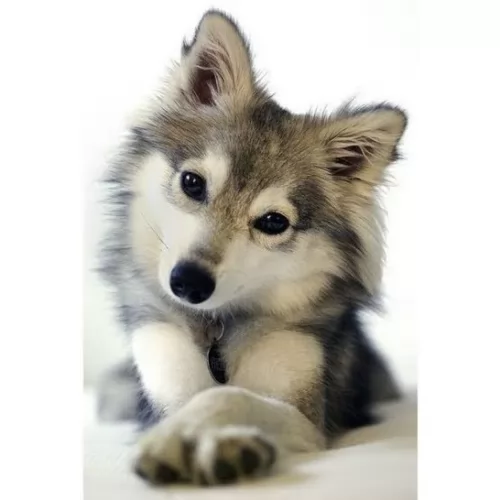 Miniature Siberian Huskies – also known as mini huskies – are your regular Siberian husky bred to be that much smaller than what the breed standard dictates.
Miniature Siberian Huskies – also known as mini huskies – are your regular Siberian husky bred to be that much smaller than what the breed standard dictates.
They’re sought after by those who love the regular sized Siberian Husky but who find the larger dog too large and boisterous. They come complete with the looks and the temperament of the Siberian Husky but they are smaller.
The origins of these gorgeous Mini huskies is conflicting though as some believe they originated in the USA. The name of Bree Normandin is bandied about when talking of the breed’s origin while other refer to Linda S. Spurlin from Alaska. She became interested in them when her full-sized husky became pregnant by a small dog.
Spurlin used Siberian and Alaskan Huskies as well as small Schipperkes and American Eskimo Dogs to bring about the mini version. They’ve got the same pedigree as the Siberian Husky, but it has been selectively bred for its smaller size, also coming from the Spitz family of dogs.
The Miniature Husky is genetically the same as the larger Siberian Husky and the AKC doesn’t recognize it as a separate breed, but sees it as a different size variation of the working-group Siberian Husky.
 Sometime between the 4th and 6th centuries, the Great Migration – a variety of dogs came to live in the Carpathian Mountains on the Great Hungarian Plain. This migration period brought sheepdogs and herders brought by shepherds. These dogs were of two sizes both small and large. The smaller ones were bred together – Pumi, Puli, and Mudi. Because of this, these breeds share the same history, with the Mundi being the oldest of them all.
Sometime between the 4th and 6th centuries, the Great Migration – a variety of dogs came to live in the Carpathian Mountains on the Great Hungarian Plain. This migration period brought sheepdogs and herders brought by shepherds. These dogs were of two sizes both small and large. The smaller ones were bred together – Pumi, Puli, and Mudi. Because of this, these breeds share the same history, with the Mundi being the oldest of them all.
The Mundi was finally separated from the other breeds about 1930 when Dr. Deszo Fenyesi began to breed them. It was in 1966 when the F.C.I. finally approved the standard for the breed. Still then as today, there were not many breeders developing the Mudi. They are working dogs – farm dogs – herders, guard dogs and ratters. He is also known as a tracker, with the majority of the breed living in Hungary.
As the Mudi was bred separately from the Pumi and the Puli, differences between the breeds became clear. Many Mudi are born with a stump or no tail at all. The Mudi is not a great dog for the first timer. He is stubborn, assertive and needs a lot of socialization and exercise. In 2004 breeders in the United States created the Mudi Club of America to preserve the breed and foster responsible ownership. This is a clever, active and keen breed, very loyal to his family but wary of strangers. The United Kennel Club recognized the breed in 2006.
In Hungary, these are still a breed of herding dogs capable of running 500 sheep at a time. They are versatile, courageous, intelligent and agile. They are great in obedience trials, agility, and flyball. In Finland and the United States, they also work as search and rescue dogs.
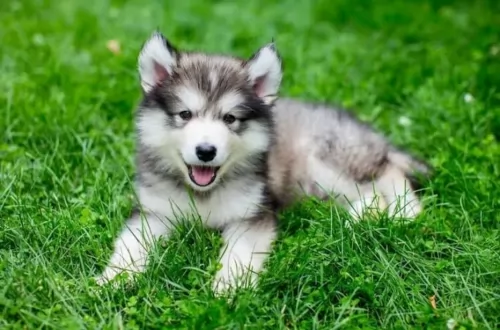 Known also as the Alaskan Klee Klai,the Miniature Siberian Husky stands at 33-39cm in height and weighs between 8 - 11kg.
Known also as the Alaskan Klee Klai,the Miniature Siberian Husky stands at 33-39cm in height and weighs between 8 - 11kg.
These mini huskies are like the larger huskies and can also come in a range of color variations such as grey and white, black and white or red and white for instance. In typical Spitz dog fashion they have the erect ears and long bushy tail. A striking feature of these dogs is the beautiful eyes – they can be brown but also a mesmerising blue.
This Miniature Siberian Husky is an intelligent dog and you’re not going to have any trouble with him teaching him some basic commands such as sit, lie-down and stay.
You need to know that these dogs aren’t going to be content lying around all day and that they want to be kept busy almost around the clock. They have always been working dogs so he will need plenty of mental – and physical exercise to keep him content. A bored, frustrated Mini Husky will just develop problem behavior through no fault of his own. People who buy high energy dogs have a responsibility towards them to keep them busy and well exercised.
These dogs are similar to their genetic ancestor, the wolf, and instead of barking, you may find him trying to communicate with a howl. One thing is sure, they make great family pets, and their gentle nature allows them to get on well with children and also not to show aggression with other dogs. They’re loyal, outgoing and charming.
 This is a medium size dog with an almost square profile. They have erect ears on wedge-shaped heads. He is not a strong boned but medium boned. That square profile is based in large part on their very square stance. Their muzzle is about half the length of their head and they have what is considered a “dare devil” expression in their dark, almond-shaped eyes. The color of the eyes is important and must match with the color of the dog or the standard is not met.
This is a medium size dog with an almost square profile. They have erect ears on wedge-shaped heads. He is not a strong boned but medium boned. That square profile is based in large part on their very square stance. Their muzzle is about half the length of their head and they have what is considered a “dare devil” expression in their dark, almond-shaped eyes. The color of the eyes is important and must match with the color of the dog or the standard is not met.
Merle fur – brown, brown speckled, blue eyes.
Brown or gray-brown fur – Brown eyes
Gray fur – gray eyes
What is not acceptable is having yellow eyes and black fur; pink eyes and white fur. The lips, eye rims, and nose must all have the same pigmentation. This should be black in all but the brown and brown-grey dogs. These dogs have brown noses, eye rims, and lips. The tail can be almost anything from full to bob. All are considered to be natural lengths for a Mudi.
Their coat is self-cleaning and won’t mat. It is on the long side. In fact, a short, flat, smooth coat is a disqualification from the standard. The color of the coat ranges from white to brown to gray, gray-brown, merle, golden, cream and white. Very little markings of any kind are usual.
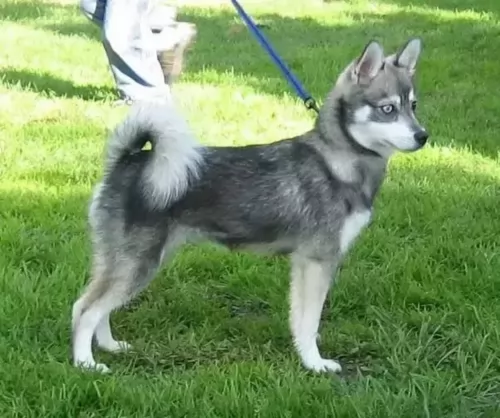 Your cuddly Mini Siberian Husky is such an intelligent dog, active and social and guaranteed to make you a splendid pet.
Your cuddly Mini Siberian Husky is such an intelligent dog, active and social and guaranteed to make you a splendid pet.
Being somewhat wary and aloof with strangers, they also make good watchdogs. They do well with children who have been taught to be kind and gentle with animals.
With good care your dog can reach up to 15 years of age, providing you with many years of superb friendship.
 Yes, they are great with children and love being a part of a large family or “pack”.
Yes, they are great with children and love being a part of a large family or “pack”.
They are extremely versatile and great at herding and guarding.
They are adaptable if you are. They don’t need to live in the country, but they need space to run and play.
They are highly intelligent but a little stubborn. Their ability to learn is high but you have to be the boss.
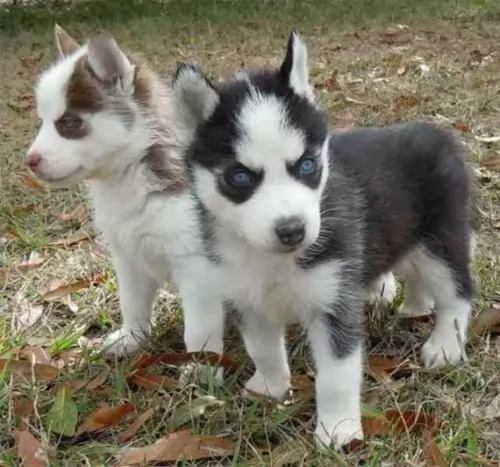 Your Miniature Siberian Husky is a healthy dog and you won’t have to spend too much money on him at the vet. However, just like with any other dog, he can battle with some of the common dog diseases -
Your Miniature Siberian Husky is a healthy dog and you won’t have to spend too much money on him at the vet. However, just like with any other dog, he can battle with some of the common dog diseases -
This eye problem affects about 10% of all Siberian Huskies and its not limited to old dogs. Juvenile cataracts can affect young dogs too. Luckily the problem isn’t painful for the dog.
Skin problems can be a concern for the Mini Siberian Husky, especially as one is used to seeing these dogs with thick coats. Follicular dysplasia is a genetic condition that causes patchy hair loss as well as a scaly, infected skin.
Check out that your dog is receiving nutritious food with vitamins and minerals as a zinc deficiency for instance can cause hair loss as well as skin problems.
 The Mudi does face several of the problems that medium to large dogs often face and some eye issues as well.
The Mudi does face several of the problems that medium to large dogs often face and some eye issues as well.
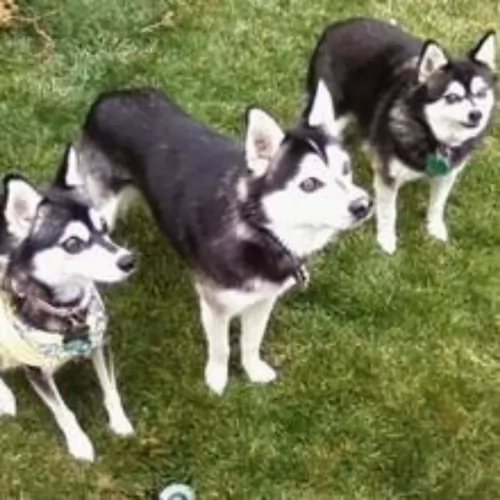 The Miniature Husky is an active and energetic breed that is going to require a lot of exercise. He is able to adapt to life in the city or the countryside but wherever you keep him as a pet, he will require regular daily exercise.
The Miniature Husky is an active and energetic breed that is going to require a lot of exercise. He is able to adapt to life in the city or the countryside but wherever you keep him as a pet, he will require regular daily exercise.
These dogs are used to cold climates so make sure your Mini Siberian Husky doesn’t overheat. Make sure that when he’s outdoors, there is shade for him and a water bowl. You’ll be doing him a real favor if you provide him with a small paddling pool to dip into on a hot day.
These are clean, odorless dogs that actually require little human help to be groomed. You can give your dog a good brush twice a week.
Mini Siberian Huskies, like the larger breed, have a high metabolism, so small amounts of highly nutritious food will do well with them. If you intend feeding your one commercially manufactured food, make sure its the high quality food that comes with plenty of minerals and vitamins. Try and avoid the low quality brands that come packed with unhealthy preservatives and colorants.
Dogs do well on simple, nutritious diets, so some boiled chicken, brown rice and raw and cooked vegetables such as carrots, potatoes and spinach added into the dry kibble from time to time will do him wonders.
Also try and include some raw meat into the kibble from time to time. That's it, as simple as that- no exotic, spicy foods and foods which we humans eat such as nuts, chips and chocolate – all can be toxic for your pet and just give him an upset stomach.
Make sure fresh, cool water is constantly available.
 The Mudi needs a high quality, medium breed puppy dry food and should be fed 3 or 4 times a day for a total of 1 and ½ to 2 cups.
The Mudi needs a high quality, medium breed puppy dry food and should be fed 3 or 4 times a day for a total of 1 and ½ to 2 cups.
The adult should be fed at least twice a day with an adult medium breed high-quality dry dog food. Don’t overfeed as the breed can have a tendency toward obesity.
They have great stamina and agility.
This is a working dog and like most herding dogs, they need a job and a lot of activity. Long walks every day and either a large yard or visits to a dog park. Involve them in herding activities or Barn Hunt if you can. Playing is their way of working when they are not herding real animals. So, if you want this breed, be sure you have time for playing with them. They are great at agility, flyball, obedience, frisbee trials, tracking and of course herding